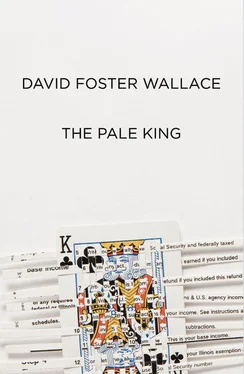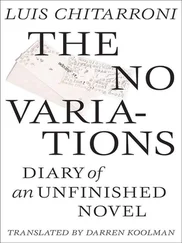‘Shut up.’
‘Define violent, though. Can’t it mean vastly different things to different people?’
‘I’ll throw you off this elevator, X, I swear to God I will.’
‘What would we expect the Hollywood corporations that make the movies to do? Would we really expect them to care about their films’ effect on violence in the culture? We might posture and send nasty letters. But the corporations, underneath all the PR bullshit, reply that they’re in business to make money for their stockholders, and that they’d give one fart in a stiff wind about what some statistics say about their products only if the government forced them to regulate the violence.’
‘Which would run into some First-Amendment trouble, big-time.’
‘I don’t think Hollywood studios are owned by stockholders; I think the vast bulk of them are owned by parent companies.’
‘ Or if what? If ordinary moviegoing people stopped going in droves to see ultraviolent movies. The movie people can say they’re only doing what corporations were designed to do — meet a demand and make as much money as is legally possible.’
‘This whole conversation is dull.’
‘Sometimes what’s important is dull. Sometimes it’s work. Sometimes the important things aren’t works of art for your entertainment, X.’
‘My point is this. And I’m sorry, X, because if I knew more about what I was talking about I could make the point faster, but I’m not used to talking about it and have never been much able even to put it into words in any sort of order — the whole thing is usually more a tornado in my head as I’m driving in in the morning thinking about what’s on the docket for the day. My only point on the movies is this: Would these statistics cause much of a decline in the crowds that go to see these ultraviolent movies in such droves? They wouldn’t. And that’s the craziness; that’s what I mean. What would we do? We’d bitch at the water cooler about these damn soulless corporations who don’t give a shit about the state of the nation but only care about making a buck. A few of them might write the Journal Star ’s op-ed page or even their Congressman. There ought to be a law. Regulate it, we’d say. But come Saturday night, they’d still go see whatever damn violent movie they and the Mrs. want to see.’
‘It’s like they expect the government to be the parent that takes away the dangerous toy, and until it does they’ll go right on playing with it. A toy dangerous to others. ’
‘They don’t think of themselves as responsible.’
‘I think what’s changed somehow is they don’t think of themselves as personally responsible. They don’t think of it like that their personal, individual going and buying a ticket for The Exorcist is what adds to the demand that keeps the corporate machines coming out with more and more violent movies to satisfy the demand.’
‘They expect the government to do something about it.’
‘Or corporations to grow souls.’
‘That example makes it a lot easier to see your point, Mr. Glendenning,’ I said.
‘I’m not sure The Exorcist is the best example. The Exorcist isn’t all that violent so much as sick. Now The Godfather— that’s violent.’
‘Never did see The Exorcist, because Mrs. G. said she’d rather have all her fingers and toes cut off with dull scissors than sit through a piece of trash like that. But from what I heard and read it was damn violent.’
‘I think the syndrome is more the not-voting one, the I’m-so-small-and-the-mass-of-everyone-else-is-so-big-what-possible-difference-does-what-I-do-make, so they stay home and watch Charlie’s Angels instead of going to vote.’
‘And then they bitch and moan about their elected leaders.’
‘So maybe it’s not a sense of the individual citizen not being responsible so much as they’re so tiny and the government and rest of the country is so big they’ve got no chance of having any kind of real impact, so they just have to look out for themselves as best they can.’
‘Not to mention how big corporations are; like how is one guy not having a Godfather ticket going to influence Paramount Pictures one way or the other? Which is all still bullshit; it’s a way to rationalize not being responsible for your tiny part of which way the country goes.’
‘All this is part of it, I think. And it’s hard to peg just what the difference is. And I’m wary about doing the old-fart move of saying people aren’t civic-minded like they were in the good old days and the country’s going to shit. But it seems like citizens — whether on taxes or littering, you name it — did feel like they were part of Everything, that the huge Everybody Else that determined policy and taste and the common good was in fact made up of a whole lot of individuals just like them, that they were in fact part of Everything, and that they had to hold up their end and pull their weight and assume what they did made some difference the same way Everybody Else did, if the country was going to stay a nice place to live.’
‘Citizens feel alienated now. It’s like me-against-everyone-else.’
‘ Alienated ’s one of those big sixties words.’
‘But how did this alienated small selfish make-no-difference thing result from the sixties, since if the sixties showed anything good it showed that like-minded citizens can think for themselves and not just swallow what the Establishment says and they can band together and march and agitate for change and there can be real change; we pull out of ’Nam, we get Welfare and the Civil Rights Act and women’s lib.’
‘Because corporations got in the game and turned all the genuine principles and aspirations and ideology into a set of fashions and attitudes — they made Rebellion a fashion pose instead of a real impetus.’
‘It’s awful easy to vilify corporations, X.’
‘Doesn’t the term corporation itself come from body, like “made into a body”? These were artificial people being created. What was it, the Fourteenth Amendment that gave corporations all the rights and responsibilities of citizens?’
‘No, the Fourteenth Amendment was part of Reconstruction and was intended to give full citizenship to freed slaves, and it was some corporation’s sharpy counsel that persuaded the Court that corporations fit the Fourteenth’s criteria.’
‘We’re talking C corps here, right?’
‘Because it’s true — it’s not even clear now when you say corporation whether we’re talking about Cs or Ss, LLCs, corporate associations, plus you’ve got closely-helds and public, plus those sham corporations that are really just limited partnerships loaded up with non-recourse debt to generate paper losses, which are basically just parasites on the tax system.’
‘Plus C corps contribute by double taxation, so it’s hard to say they’re nothing but a negative in the revenue sphere.’
‘I’m giving you a look of complete scorn and derision, X; what do you imagine it is we do here?’
‘Not to mention fiduciary instruments that function almost identically to corporations. Plus franchise-spreads, flowthrough trusts, NFP foundations established as corporate instruments.’
‘None of this matters. And I’m not even really talking about what we do here except in the sense that it puts us in a position to see civic attitudes close up, since there’s nothing more concrete than a tax payment, which after all is your money, whereas the obligations and projected returns on the payments are abstract, at the abstract level the whole nation and its government and the commonweal, so attitudes about paying taxes seem like one of the places where a man’s civic sense gets revealed in the starkest sorts of terms.’
Читать дальше












